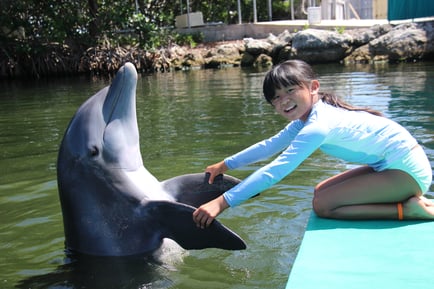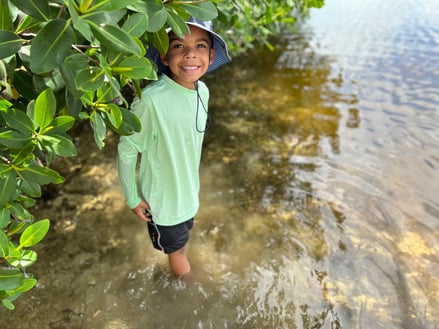There, you’ll find the only living coral barrier reef in the continental United States along with many incredible nature parks and unique wildlife.
Along the way, students can explore the state’s historical significance as they witness early European settlements, hear the role Florida had in the Civil War and pause to learn about salvagers who were responsible for the early economic impacts on the area before tourism took hold.
During your experiential learning in the Keys, you’ll witness unique marine life and coastal ecosystems you won’t find anywhere else. As students learn about these fragile areas, they’ll have the opportunity to develop an appreciation for them while also becoming advocates for preservation through conservation efforts.
It’s challenging to teach students from a textbook about why protecting the Everglades and other fragile ecosystems that have dwindled due to development and human impacts is so crucial. But seeing it all firsthand and meeting endangered wildlife at risk of extinction can help bring this issue to life for your students.
Florida Keys Ecosystems Field Trips Can Explore
The Florida Keys supports one of the most unique and diverse assemblages of plants and animals in North America making them an ideal destination for field trips. Take a moment to learn more about these complex ecosystems and how you can educate students about their importance during your field trip experiences.

Seagrass
The Florida Keys are home to one of the largest seagrass beds in the world. Seagrasses are found on the bottom of protected bays, lagoons, and other shallow coastal waters. Seagrass communities are important in tropical and temperate marine food webs, providing habitat for a diversity of marine animals. Some animals feed directly on the seagrass blades and roots while others scrape microorganisms from the seagrass blades. Large predators also visit seagrass beds in search of prey. Seagrass stabilizes sediments and prevents erosion along Florida's coastline. Seagrasses also take up dissolved nutrients and trap sediments in the water resulting in high water clarity.
Sadly, the presence of seagrass is declining rapidly due to water quality degradation, dredging, coastal development, boating, increases in sea temperatures, and elevated water salinity due to decreased amounts of freshwater. As their habitat diminishes, it leaves the marine wildlife at risk of extinction.
Mangroves
The term “mangroves” refers to certain species of tropical tree/shrub or to the entire plant community that can grow in saline soils/environments. Mangroves are important in many ways such as erosion prevention, water quality maintenance, and sustaining recreational fishery industries. Mangroves support the lives of many threatened and endangered species that would likely go extinct without this special community.
The trees’ canopies also serve as nesting and roosting areas for many resident and migrating bird species.
Tragically, Mangroves have been at risk since the 1940s when dredge and fill operations in the Florida Keys began. Severe weather events have also contributed to the challenges these trees face.
Coral Reef
The Florida Keys are home to the third largest barrier coral reef in the World! The coral reef stretches 350 miles and provides homes to 40 species of reef-building corals. Rich in biodiversity coral reef ecosystems are often known as “rainforests of the sea”. This fragile ecosystem is home to millions of plants and animals.
At first glance, corals might look like plants and rocks. But they are actually animals related to jellyfish and anemones. Corals are made up of colonies of organisms called polyps. These amazing creatures grow and develop in environments where there are tropical or subtropical temperatures and where there is a solid structure that they can attach to. The water’s salinity is also a factor in the corals’ ability to thrive. That’s why Florida’s shallow offshore waters are ideal for these creatures.
Exploring the Everglades
The Everglades are the ideal outdoor classroom. With so much to explore, you can build your experience around your curriculum and supplement it with classroom materials provided for school groups. Or work with a ranger to create tailored experiences based on your goals around educating your students.
This is where you’ll get exposure to Mangrove trees, and learn about the biodiversity they help foster. Pause and take in the endangered wildlife to help make these creatures come to life for your students.
In the Everglades, you can explore these areas:
- Visitors Center complete with videos and overviews to help get you started
- Wildlife viewing in the winter along the Anhinga Trail and Gumbo Limbo Trail
- Learn about the subtropical tree island along the Mahogany Hammock Trail
- Head to the observation tower for impressive River of Grass views
- From the Flamingo Visitor Center, take the narrated boat tour through Whitewater Bay
- Take a narrated tram tour from Shark Valley for panoramic views
- Enjoy the Gulf Coast boat tour as you explore the Ten Thousand Islands
Florida Keys Educational Benefits
Science, wildlife, and the intricate balance between protecting endangered ecosystems and the creatures that call it home can truly come to life during a trip to the Florida Keys in a way a textbook or classroom lesson cannot replicate. Here are some Florida Keys educational benefits:

- Understanding marine life and its intricate balance
- Learning the importance of coral reef conservation
- Ecosystem connections and ways to preserve them
- A holistic, immersive, educational experience that helps students remember what they learned through hands-on learning
- Diverse field trip options to match any curriculum or educational goals
Planning Your Field Trip to the Florida Keys
With so much to explore and experience during a trip to the Florida Keys, you might want to allow several days for your students to explore and learn. A visit to the Dolphins Plus Marine Education Center can help prime students with hands-on learning in a mixture of classroom, lab and a real lagoon setting to prepare for additional stops, including the Everglades. You’ll learn about more than dolphins, including the intricate balance required for ecosystem conservation and how students can get involved. Learn more about Dolphins Plus educational field trips here.
Educators should contact Marylou Wright at Marylou@DolphinsPlus.com. Our team will help you prepare for an unforgettable learning experience while covering what students need to know about the area.







